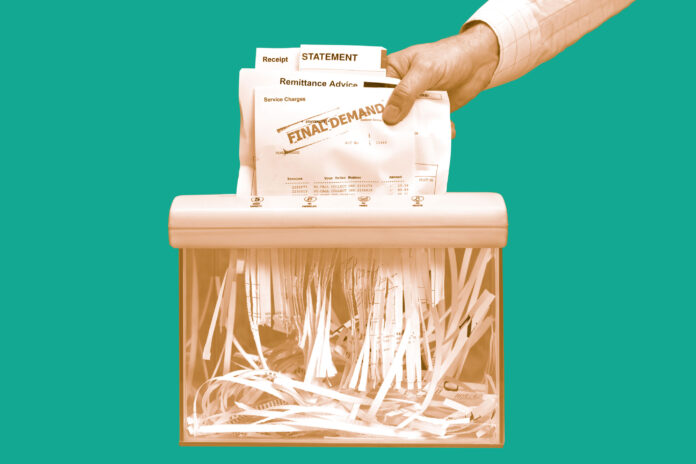In an era dominated by advanced technology and a pervasive online presence, the threat of identity theft looms larger than ever before. With just a few clicks, cybercriminals can gain access to our most sensitive personal information, wreaking havoc on our lives. While many individuals have become more vigilant in securing their digital data, it’s crucial not to overlook the vulnerability of physical documents as well. In this article, we will explore the importance of proper disposal methods for protecting ourselves against identity theft and highlight the significance of shredding as a secure means of ensuring confidential information remains inaccessible once discarded.
The Growing Threat of Identity Theft
Proper disposal of sensitive documents is crucial in preventing identity theft. Despite the digital age we live in, physical documents still contain a wealth of personal information that can be exploited by identity thieves. Simply throwing away old bank statements, credit card bills, or medical records can leave individuals vulnerable to fraud and unauthorized access to their personal information. It is important to shred these documents before discarding them to ensure that all sensitive data is securely destroyed.
Identity thieves often resort to dumpster diving or rummaging through trash cans to find discarded documents containing valuable personal information. By shredding these papers, individuals can greatly reduce the risk of their identities being stolen. Additionally, it is advisable to invest in a cross-cut shredder rather than a strip-cut one since cross-cutting produces smaller confetti-like pieces that are much harder for identity thieves to piece back together.
The Importance of Shredding Personal Documents
Identity theft is a growing concern in today’s digital age, and it is crucial to take necessary precautions to protect oneself. One often overlooked aspect of identity theft prevention is the proper disposal of personal documents. Many people falsely assume that simply throwing away their old bank statements or credit card receipts in the trash bin is sufficient. However, this couldn’t be further from the truth.
Shredding personal documents before disposal ensures that sensitive information remains confidential and out of the hands of identity thieves. By shredding documents such as tax returns, financial statements, medical records, and even junk mail containing personal details like names and addresses, individuals can significantly reduce their risk of falling victim to identity theft. Without shredding these documents, criminals can easily retrieve them from trash bins or dumpsters and use the information contained within to perpetrate fraud or steal someone’s identity.
Secure Disposal Methods for Digital Data
One secure disposal method for digital data is physical destruction. This involves physically destroying the storage media on which the data is stored, such as hard drives, USB drives, or CDs/DVDs. Methods of physical destruction include shredding, crushing, or melting the media to ensure that the data cannot be recovered.
Another secure disposal method is degaussing. Degaussing uses a powerful magnetic field to erase the data stored on magnetic media, such as hard drives or tapes. By exposing the media to this magnetic field, all of the data is effectively erased and rendered unrecoverable. A third secure disposal method is overwriting. This involves writing new data over existing data multiple times until it becomes unreadable and unrecoverable. There are software programs available that can overwrite files and entire storage devices with random characters or patterns to ensure that the original data cannot be retrieved.
Safeguarding Against Dumpster Diving Attacks
One effective way to safeguard against dumpster diving attacks is to implement a strict policy of shredding all sensitive documents before disposal. Identity thieves often target dumpsters in search of discarded paperwork containing valuable personal information such as social security numbers, bank account details, or credit card statements. By properly shredding these documents, you can significantly reduce the risk of falling victim to dumpster diving attacks and protect yourself from identity theft.
Another important measure to take is to limit the amount of personal information that is printed and stored on physical copies. In today’s digital age, it is increasingly common for individuals and businesses to rely on electronic means for communication and record-keeping. By minimizing the amount of personal information that is physically printed and stored, there will be fewer opportunities for identity thieves to find valuable data through dumpster diving.
Conclusion: Taking Steps to Protect Your Identity
In conclusion, proper disposal of sensitive documents is crucial for preventing identity theft. Shredding documents containing personal information ensures that the data cannot be pieced back together and used maliciously. Additionally, incorporating digital practices such as securely deleting files and wiping hard drives can provide an extra layer of protection. It is essential for individuals and businesses alike to prioritize proper disposal methods to safeguard their sensitive information from falling into the wrong hands. By contacting paper shredding services los angeles or by taking these simple steps, we can all contribute to a safer digital landscape and protect ourselves from the devastating consequences of identity theft. So let’s remember: shred and forget!
